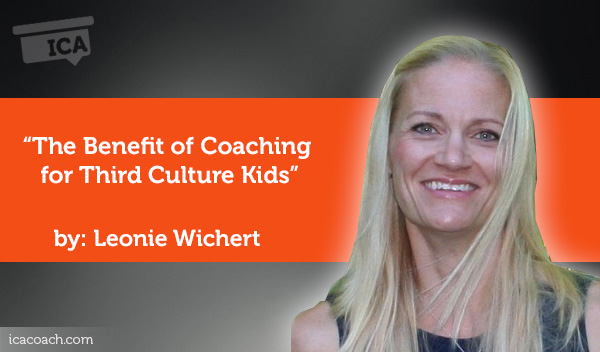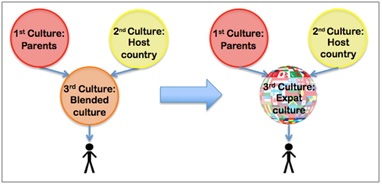
Research Paper By Leonie Wichert
(Life Coach, UNITED KINGDOM)
Introduction
The area I am investigating is that of so-called Third Culture Kids. It is an area I have personal experience with and believe that coaching can have a positive impact on.
I have lived most of my adult life abroad, moving house 19 times in 20 years. I have lived in twelve different cities, in six different countries. And, this was my choice and I totally enjoyed 17 of the 19 moves and the experiences they brought with them.
Then, a year before my 18th move, my husband and I had our first baby boy. Being experienced in moving countries and wanting my son to have an international upbringing, I was thrilled when my husband had the opportunity to get transferred abroad. There was no question in my mind that this chance must be seized. A few weeks later, my husband and I moved a happy, outgoing one-year-old across the Atlantic Ocean.
We did our research on how to raise a bilingual child and that was that. What else was there to research? All we ever heard was that children have no problems moving to another country, especially at a young age. They are resilient and adaptable. All they need at this age is their parents’ love; so allowing our son to add some valuable skills such as being open-minded, flexible and bi-lingual to his portfolio couldn’t hurt, could it.
Fast-forward: Six month after our move abroad, we had our a second child and two years later, we decided to move to yet another country, so that by the age of four, our first-born had lived in three different countries. And being completely honest, resettling a family, especially two young children turned out to be a dreadful experience and my expectations, hopes and dreams popped one after the other like bubbles in the air. What went wrong, why did reality not turn out like I had imagined and experienced it before?
I came to believe that this was partially due to the different circumstances of my own status during these moves, and mostly, because I now moved with infants and toddlers, who do love nothing more, as mentioned above, than their parents/ caregivers and also routine, stability, predictability, and consistency – the latter four needs are of course by no means fulfilled by a move to a different country; a place where everything is different and all your infant’s senses may experience an overload. The food tastes and looks differently; the sounds and language are different as are the smells. In addition, the child’s loving mommy and daddy are shifting their focus away from the child while they move in-between feeling moderately and extremely stressed as they try to find their way around the logistics and emotions of giving up one life and starting a new one, usually in a matter of weeks.
In addition, daddy is much less available all of a sudden, as he –as in our case- did not only move several weeks before us, but also –as in many cases- dads and husbands are less present as they “spend a lot of time at work since they are under pressure to adapt to the new office culture and their overall responsibilities are often larger than they have experienced before”.[1]
To make sense of my differing experiences and to understand my contradicting feelings, I decided to do some research around this topic. That is when I came across astounding information; facts, experiences, and opinions.
I found quite a lot of information on the different aspects of moving your family abroad on the internet. I read about numerous positive experiences of families who have lived abroad, who had not experienced anything but the hopes I had had; I came across some studies that examined how to prevent failure of expatriations (i.e. premature return of expats) as it is a huge financial burden for the company; and then I stumbled across some negative experience reports of accompanying expat mothers and partners.
I then realized that my personal experiences are not as unique as I had believed. Experiences just like mine have been grouped and categorized with their very own and quite extensive jargon. There was the expat mobile family, the trailing spouse, the orphan spouse, global nomads, and third culture kids.
 The term that interested me most was that of the Third Culture Kid, or TCK, which I had never heard of before, even though it is not a very recent concept. Sociologist Ruth Hill Useem who used this term to refer to children who accompany their parents into a different culture coined it in the 1950s.[2] Today, this term has been slightly adapted from its original meaning. Initially, the third culture implied a blended culture in which the child, who spends part of his or her developmental years abroad, integrates aspects of their parent’s culture (the first culture) and the new culture (the second/ host country culture).[3]
The term that interested me most was that of the Third Culture Kid, or TCK, which I had never heard of before, even though it is not a very recent concept. Sociologist Ruth Hill Useem who used this term to refer to children who accompany their parents into a different culture coined it in the 1950s.[2] Today, this term has been slightly adapted from its original meaning. Initially, the third culture implied a blended culture in which the child, who spends part of his or her developmental years abroad, integrates aspects of their parent’s culture (the first culture) and the new culture (the second/ host country culture).[3]
Over time, research has shown that even though TCKs build relationships to both cultures (parents’ and host country’s culture), they do not feel fully at home in either.[4] Elements from each culture are assimilated into the TCK’s life experience, but the sense of belonging is in relationship to others of the same background, i.e. other children who have lived abroad.[5] Therefore, the third culture is rather the expat culture.
 Once I started finding out more about Third Culture Kids, I came across research that described exactly what I had expected and wished for my children when we decided to move abroad. I read research that pointed out that growing up in a different country leads to “proficiency in multiple languages, intercultural sensitivity, expanded worldviews, open-mindedness and cultural empathy” to mention but a few aspects.[6] Further it stated that children who grow up in more than one country “will enter adulthood armed with skills to handle change and to communicate across cultures”.[7] Wow!
Once I started finding out more about Third Culture Kids, I came across research that described exactly what I had expected and wished for my children when we decided to move abroad. I read research that pointed out that growing up in a different country leads to “proficiency in multiple languages, intercultural sensitivity, expanded worldviews, open-mindedness and cultural empathy” to mention but a few aspects.[6] Further it stated that children who grow up in more than one country “will enter adulthood armed with skills to handle change and to communicate across cultures”.[7] Wow!
Not surprisingly, looking at this skill set, TCKs have been called the “prototype citizen of the future”.[8] Maybe my kids are simply an exception or I have been a complete parenting failure … Or maybe not…
All that glitters isn’t gold
When scratching this spectacular surface of who TCKs are, it soon becomes clear that there is another dimension to these children’s experience. Here is an excerpt from an expat mother whose daughter struggled as a result of her parents having to move to another country/ countries[9]:
My daughter celebrated her 14th birthday by going out with her best friend for lunch and a spot of shopping. She had a great day out, a large slice of chocolate cake and bought herself a little gift with her pocket money.
On her return she unwrapped the small package and locked herself in the toilet. She took the pencil sharpener out, dismantled it and used the blade to carve a deep cut into her leg.
Before considering our initial move overseas, we asked around and heard many positive stories about leading the expat life with children. Nobody told us anything negative at all. Everyone else’s kids seem to cope well with this lifestyle. Perhaps this is a myth?
She’ll have a greater world view and understanding of the diversity of cultures.
Indeed this is true and I’m sure it will be relevant when she’s an adult. Right now, though, it is not an issue. Will she even make it to adulthood? I can’t help my thoughts drifting in this agonising direction.
Kids are resilient and can deal with anything.
No. They can’t. They are, however, very good at pretending all is well.
She’ll learn loads of languages.
Agree. She can speak four languages and is top of the class for another two, but she cannot find the words in her native tongue to explain why she self-harms. […]
Sticks and stones may break my bones, but words can break my soul.
A fair amount of the bullying during her early school years was based on her not ‘looking the same’ as most other kids in her school and being “too stupid to speak our language” (after only being in that country a few weeks). International schools do have kids from many countries, but overall there seems to be far more from the host country and, as the majority, it’s this group that a child aims to ‘fit in’ with.
She desperately wants to fit in but is so used to being different that she’s confused about who she is and who she wants to be. On one hand she wants to be different while on the other she wants to fit in.
This child is unfortunately not an exception.
Challenges of international mobility
In their book about Third Culture Kids, Pollock and Van Reken outline a list of challenges faced by TCKs that shows the negative side of moving between countries as well. Accordingly, some third culture kids struggle, among other things, with[10]:

mistrust, fear of attachment & emotional detachment/ numbness, feeling powerless/ choiceless, denial of own feelings, difficulty making decisions, rootlessness (lack of sense of belonging), restlessness, loneliness, difficulty with identity formation, insecurity, delayed adolescence, feeling different, unresolved grief
One of the main and most immediate aspects that face children when moving abroad is grief. According to Van Reken, “transition always involves loss, no matter how good the next phase will be. Loss always engenders grief and the greater you have loved a situation or place or people, the greater the grief.”[11] Sometimes it is called ‘expat grief’ or ‘relocation grief’.
Children are often unaware of their grief and grieve in silence or try to ignore the loss associated with change because they do not have the necessary understanding and way of expressing their feelings. They may feel powerless and resigned, as it is not their decision to move. They may be reassured by their parents (‘you will adapt, it will be a great experience’), but they are often not given the space and time to mourn their losses.[12] And this may be the case for various reasons.
 Often, parents are close to their limits themselves and feel overwhelmed dealing with the practicalities of an international move; e.g. dissolving their household in the home country, supporting the kids to settle in a new country, handling all the phases of their own culture shock, managing the challenging new work, mastering a new language; and for the expat partner, you can add the loss of their professional identity, financial independence and close support network.[13]
Often, parents are close to their limits themselves and feel overwhelmed dealing with the practicalities of an international move; e.g. dissolving their household in the home country, supporting the kids to settle in a new country, handling all the phases of their own culture shock, managing the challenging new work, mastering a new language; and for the expat partner, you can add the loss of their professional identity, financial independence and close support network.[13]
Further, the way grief is expressed can differ and be misinterpreted or seen as age-appropriate behavior as a toddler’s anger tantrum can have a million reasons. A teenager’s withdrawal may appear natural, as does their rebellion. Instead of love and understanding, these expressions of grief are too often ignored, met with punishment, or scolding, because the root cause is not recognized.
And even without the above-mentioned added stress factors for parents, when the grief is expressed through depression and sadness, it can be rather overwhelming; the powerlessness of it often unbearable. We tend to circumvent the sadness, distract and redirect our child’s focus in order to end their distress as quickly as possible, to alleviate their pain. Hence, we try to quell the onset of sadness by focusing on the positives –a bigger house, a lovely garden, maybe the prospect of a new pet.
The child’s grief remains invisible.
It is widely accepted that unresolved grief can have significant lasting negative impacts. According to David Pollock’s research on TCKs, “[u]nresolved grief will always express itself somehow. Often it will be in ways that appear completely unrelated to feelings of grief”.[14] Kathleen Gilbert has also researched grief among TCKs, and writes, “[l]osses that are not successfully resolved in childhood have an increased likelihood of recurring in adulthood.”[15]
In the hectic of new beginnings, it is very important to pay attention to the following behaviors as they can be indicative that a child is struggling[16]:
How to support a struggling child
During their childhood and adolescence, TCK’s experiences of the moves, the relationships, the places, the losses, the discoveries, the opportunities, and separation after separation, make for a complicated and confusing inner world.[17]
When children are unable to work through their pain of parting, their sadness can turn into anger, or inner withdrawal, which, in extreme cases can lead to depression; or separation anxiety and/or commitment phobia out of fear to be rejected, abandoned and/ or hurt.
Therefore, it is crucial to let children feel that their grief and its expression is ok and good. Children need to be given the chance to talk about fears, worries and losses. They need a trusted person to actively listen; to be present and to give them their entire attention. They need someone to extract their feelings and needs from what they say, mirror these feelings back and move beyond the story.[18] I believe that coaching can achieve this.
Coaching can help Third Culture Kids, especially during their teenage years, to reframe their experiences and focus on the positive aspects, while acknowledging the grief of losses; to find a way to voice their feelings, to feel okay with seemingly opposed emotions, to accept their sadness and yet feel happy in a new location; understand that finding new friends does not mean a betrayal of old friendships; that feeling ‘different’ and out of sync with their peers is not unusual.
Coaching can help to discover and accept their unique identity, to explore the new culture and look for commonalities instead of differences, discover new hobbies and retain traditions and customs of their own.
Coaching can offer teenagers a safe space to work through their resentment, and explore their feelings, goals and ambitions.
Coaching may prevent TCKs from developing unhealthy habits and/ or mental health problems because they do not feel heard and understood.
Resources
[1] Reasons For The Failure Of An Assignment Abroad And The Pre-Return Of An Employee, retrieved on 12 May 2017 at:
[2] What is a TCKid retrieved on 12 May 2017 at:
[3] The Useems defined Third Culture as:
The behavior patterns created, shared, and learned by men (sic) of different societies who are in the process of relating their societies, or sections thereof, to each other. (Useem, Useem and Donoghue, 1963:169); The History of a Concept, retrieved on 12 May 2017 at http://tckresearcher.net/TCK%20Hist%20%2712%20FIGT%20res.%20Newsltr%20copy.pdf
What is a TCKid; retrieved on 12 May 2017 at:
[4] In case of multiple moves to different countries, this implies that children build relationships to all cultures, but do not feel home in any, according to Useem.
[5] Third Culture Kids: Growing Up Among Worlds, Revised Edition Paperback – September 16, 2009 by David C. Pollock and Ruth van Reken
[6] Finding Home Between Worlds -Who are third culture kids? by Marianna Pogosyan, Ph.D, posted on Mar 30, 2016, retrieved on 12 May 2017 at: https://www.psychologytoday.com/blog/between-cultures/201603/finding-home-between-worlds
[7] Finding Home Between Worlds -Who are third culture kids? by Marianna Pogosyan, Ph.D, posted on Mar 30, 2016, retrieved on 12 May 2017 at: https://www.psychologytoday.com/blog/between-cultures/201603/finding-home-between-worlds
[8] In 1980, Ted Ward, missionary and professor of education at the Michigan State University, designated children of missionaries as prototype citizens of the future. This quote was later applied to TCKs. (Third Culture Kids: Growing Up Among Worlds, By David Pollock, Ruth Van Reken)
[9] A troubled expat child, retrieved on 12 May 2017 at: http://expatchild.com/tck-problems/
[10] Third Culture Kids: Growing Up Among Worlds, Revised Edition Paperback 2009, by David C. Pollock and Ruth E. Van Reken, pp. 101, 106, 109, 123, 126, 138, 151
[11] The trouble with Third Culture Kids by Nina Sichel, co-editor of the collections Writing out of Limbo: International Childhoods, Global Nomads and Third Culture Kids (2011); retrieved on 19 May 2017 at
The_Trouble_with_Third_Culture_Kids.pdf
[12] How to help your children say goodbye, published 1 July 2015, retrieved on 25 May 2017 at http://expatchild.com/how-to-help-children-say-goodbye/
[13] Why Trailing Spouses Can’t Be Happy (and What Can Be Done), published April 9, 2013, retrieved on 12 May 2017 at: http://expatriateconnection.com/WHY-TRAILING-SPOUSES-CANT-BE-HAPPY-AND-WHAT-CAN-BE-DONE/
[14]Third Culture Kids: Growing Up Among Worlds, Revised Edition Paperback 2009, by David C. Pollock and Ruth E. Van Reken, p. 160
[15] Loss and Grief between and Among Cultures: The Experience of Third Culture Kids by Kathleen R. Gilbert; retrieved on 19 May 2017 at http://journals.sagepub.com/doi/pdf/10.2190/IL.16.2.a
[16] An unhappy expat child, retrieved on 23 May 2017 at http://expatchild.com/unhappy-expat-child/
[17] retrieved on 22 June 2017
[18] Expat-Leben: Third Culture Kids – oder: Wie wir unsere Kinder trösten können; retrieved on 22 June 2017 at http://www.expatmamas.de/expat-leben-third-culture-kids-oder-wie-wir-unsere-kinder-troesten-koennen/